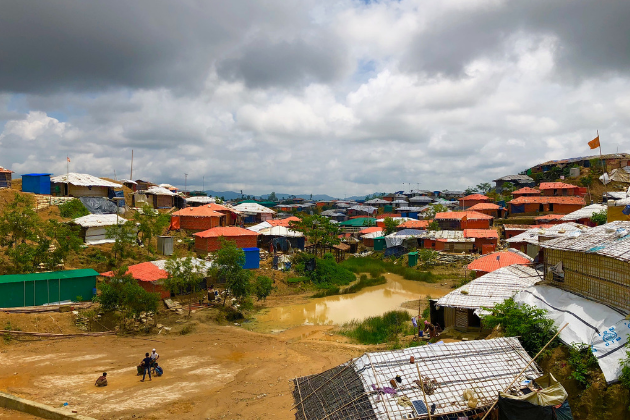 Storm clouds gather over the Rohingya camps. A view of the Military Road, near Ukhiya, Bangladesh
Photo: WHO Bangladesh
Storm clouds gather over the Rohingya camps. A view of the Military Road, near Ukhiya, Bangladesh
Photo: WHO Bangladesh
The cyclone season is fast approaching and Rohingya camps must be prepared for possible emergencies. WHO has pre-positioned essential medicines and emergency health supplies in warehouses at Cox’s Bazar and two locations in the Rohingya camps complex.
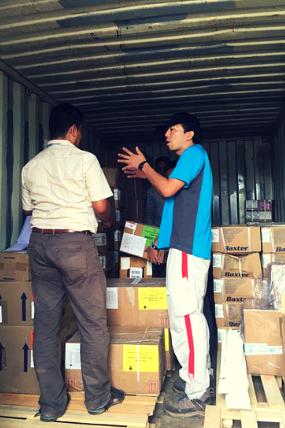 Photo: WHO Bangladesh
Photo: WHO Bangladesh
The strategic stocking-up of supplies in the Rohingya camps ensures that if health-sector partners need urgent access to emergency medical supplies, or in case roads are washed out, they can make a quick call to the WHO health logistics team and arrange a pick-up. The supplies can be used for disease outbreaks or mass casualty events, besides treating individual patients.
The Samaritan’s Purse and International Organization for Migration (IoM) staff support this effort. The Samaritan’s Purse 24/7 health facility on the Army Road, and the IoM logistics hub in Nhilla, Teknaf house the two temperature-controlled storage containers.
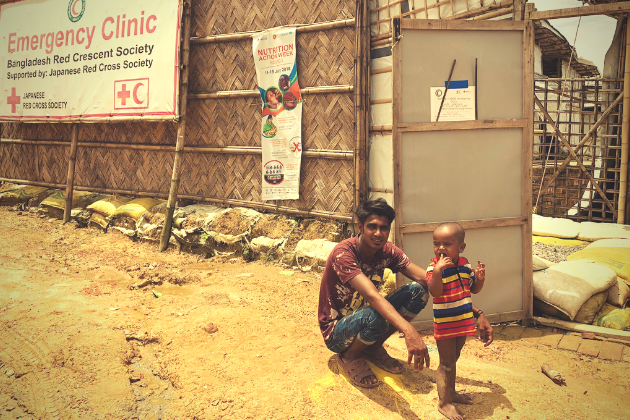 A father and child wait outside the Bangladesh Red Crescent Society/Japanese Red Cross (BDRCS/JRC) emergency clinic
Photo: WHO Bangladesh
A father and child wait outside the Bangladesh Red Crescent Society/Japanese Red Cross (BDRCS/JRC) emergency clinic
Photo: WHO Bangladesh
Emergency access to WHO’s pre-positioned health supplies was recently put to a test. The Bangladesh Red Crescent Society (BDRCS)/Japanese Red Cross (JRC) emergency clinic in Camp 12 needed urgent medical supplies to support a burns victim during the religious holiday of Eid. The stocked supplies saved the Red Cross medical staff a long drive to Cox’s Bazar during the busy holiday period. They were able to obtain an emergency health kit and normal saline a short distance away, at the Samaritan’s Purse health facility.
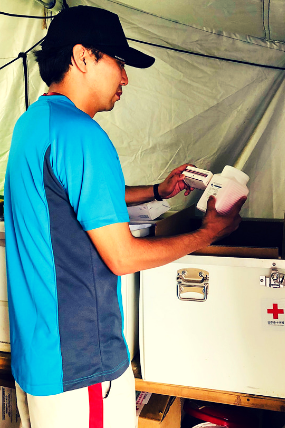 Japanese Red Cross pharmacist Yasutoro Nakazato inspects a box of medications that have just been delivered by the team to the BDRCS/JRC emergency clinic
Photo: WHO Bangladesh
Japanese Red Cross pharmacist Yasutoro Nakazato inspects a box of medications that have just been delivered by the team to the BDRCS/JRC emergency clinic
Photo: WHO Bangladesh
Yasutaro Nakazato, organizes the pharmacy and makes sure the supplies are current and accounted for. As the clinic’s pharmacist, Nakazato works with a team of trained BDRCS staff and Rohingya-speaking volunteers. He is grateful the contingency measures are in place.
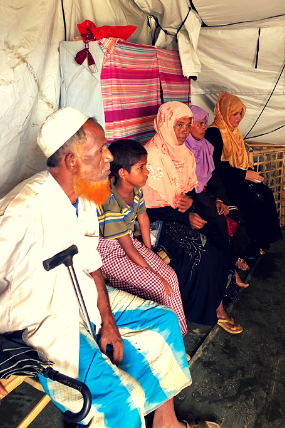 Rohingya patients at the BDRCS/JRC emergency clinic in Camp 12 wait to be called to pick up their medications. At its busiest times the clinic staff will see 150 patients a day.
Photo: WHO Bangladesh
Rohingya patients at the BDRCS/JRC emergency clinic in Camp 12 wait to be called to pick up their medications. At its busiest times the clinic staff will see 150 patients a day.
Photo: WHO Bangladesh
‘We have about 150 patients a day at our busiest time,’ he says. ‘We treat them for a range of incidents, from diarrhea and headaches, to wounds caused by chopping bamboo and traffic accidents. We have to be on guard for disease outbreaks. We are also expecting a lot more accidents as the roads get muddy, or when people get injured in accidents or by debris on the road.’
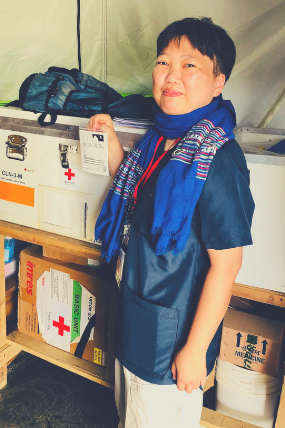 Head nurse of the BDRCS/JRC emergency clinic Mayumi Kawaguchi holds up a prescription card printed with easy-to-recognize symbols for Rohingya patients. ‘Many of our patients can’t read or write, so we have to make sure they have clear instructions and this card, so they take the medications at the right time,’ she says.
Photo: WHO Bangladesh
Head nurse of the BDRCS/JRC emergency clinic Mayumi Kawaguchi holds up a prescription card printed with easy-to-recognize symbols for Rohingya patients. ‘Many of our patients can’t read or write, so we have to make sure they have clear instructions and this card, so they take the medications at the right time,’ she says.
Photo: WHO Bangladesh
Head nurse at the Red Cross clinic, Mayumi Kawaguchi is an experienced aid worker.
‘This clinic can use the emergency supplies to treat basic conditions with antibiotics and pain relief’, she says.
Dr Khalid El Tahir, WHO’s Incident Manager in Cox’s Bazar says, he feels encouraged that the contingency arrangements for accessing emergency medical supplies in the camps worked seamlessly during such a busy period.
‘While the monsoon season is drawing to a close, these contingency arrangements will be just as important for the upcoming cyclone season.’
Activities depicted in this material have benefited of funding from Government of the Republic of Korea through the project Support WHO's emergency health activities in Bangladesh.
